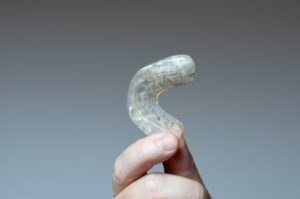 According to the American Dental Association, bruxism, also known as chronic teeth grinding, affects between 10 and 15 percent of the adult population. Millions of people wake up to a sore jaw, headaches and migraines, and even cracked teeth because they didn’t have the protection they needed. Luckily, your dentist in Lincoln has just the solution to make these symptoms disappear, quite frankly, overnight.
According to the American Dental Association, bruxism, also known as chronic teeth grinding, affects between 10 and 15 percent of the adult population. Millions of people wake up to a sore jaw, headaches and migraines, and even cracked teeth because they didn’t have the protection they needed. Luckily, your dentist in Lincoln has just the solution to make these symptoms disappear, quite frankly, overnight.
What are Nightguards?
Nightguards are custom-made oral appliances that are most often worn at night. They are similar to sports guards, however their purpose is different. Instead of protecting your teeth from a tackle or bad fall, they protect them from the constant grinding, scraping, and clenching that comes with bruxism. While nightguards are available at any typical pharmacy, they often don’t last for very long. For this reason, your dentist recommends you have them customized to match your teeth and mouth shape exactly for maximum coverage and effectiveness.
If you aren’t sure if you have bruxism, take note of the following symptoms:
- Grinding or clenching sounds at night
- Tight or painful jaw muscles upon waking up
- Chronic facial or jaw pain
- Occasional swelling on the side of the lower jaw causing the clenching
- Rhythmic contractions in the jaw muscles
What Issues Can I Prevent?
Not only can you completely eliminate the symptoms mentioned above, but you can also reduce your risk of developing other conditions and treat other issues that often accompany teeth grinding.
For example, many patients with crooked teeth have a tendency to grind teeth as well. This typically results in them developing TMD, or temporomandibular joint disorder. This refers to the joint that connects the lower mandible to the skull. When biting force is unevenly distributed in the mouth, it puts additional stress on this joint, exacerbating many of the common symptoms you experience with bruxism.
Furthermore, many nightguards work to open the mouth more while in use. This can help patients who also have mild sleep apnea, which is a condition that causes blockages in the mouth to interrupt breathing while asleep. An oral appliance like a nightguard can successfully keep the airway clear, allowing the air to travel freely through the mouth. This also works to reduce snoring.
How are Night Guards Made?
The process of making a nightguard occurs in roughly three steps. They include:
- Impression Taking – Completed using a putty-like material that patients bite into. This is followed by making a negative copy of the upper and lower teeth, which is used to make a plaster cast (mould).
- Night Guard Fabrication – A hard acrylic is shaped around the mould, followed by additional adjustments to confirm the bite is even.
- Fitting – Once fabricated, your dentist in Lincoln will confirm the nightguard fits properly. If not, another impression will be made.
Don’t let bruxism ruin your night’s sleep. Schedule an appointment with your dentist today to get treated!
About the Author
Dr. Louis Olberding earned his DDS degree from the University of Nebraska Medical Center College of Dentistry. He helps patients create many dental devices to relieve their symptoms, including nightguards and oral appliances for sleep apnea. To learn more about his practice, contact him through his website.
